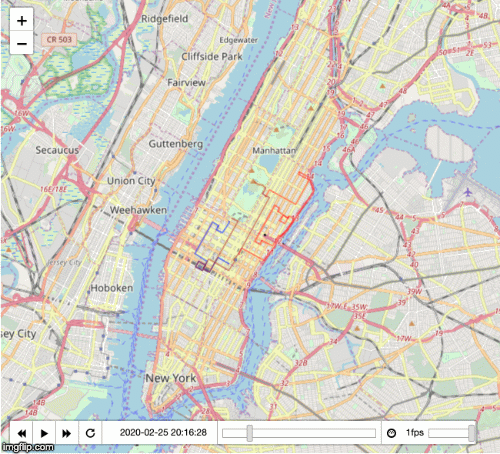simobility is a light-weight mobility simulation framework. Best for quick prototyping
simobility is a human-friendly Python framework that helps scientists and engineers to prototype and compare fleet optimization algorithms (autonomous and human-driven vehicles). It provides a set of building blocks that can be used to design different simulation scenarious, run simulations and calculate metrics. It is easy to plug in custom demand models, customer behavior models, fleet types, spatio-temporal models (for example, use OSRM for routing vehicles and machine learning models trained on historical data to predict ETA).
Create an environment for experiments with machine learning algorithms for decision-making problems in mobility services and compare them to classical solutions.
Some examples:
-
Deep Reinforcement Learning with Applications in Transportation
-
T. Oda and C. Joe-Wong, "Movi: A model-free approach to dynamic fleet management". 2018
pip install simobility
Thanks to all who contributed to the concept/code:
Benchmark simulations with LinearRouter and GreedyMatcher. Simulations will run slower with OSRMRouter because OSRM cannot process requests as fast as the linear router.
Processor: 2,3 GHz Dual-Core Intel Core i5; Memory: 8 GB 2133 MHz LPDDR3
| Simulated time | Simulation step | Vehicles | Bookings per hour | Execution time | Generated events | Pickup rate |
|---|---|---|---|---|---|---|
| 1 hour | 10 sec | 50 | 100 | 4 sec | 1082 | 96.97% |
| 24 hours | 1 min | 50 | 100 | 12 sec | 23745 | 88.37% |
| 24 hours | 10 sec | 50 | 100 | 20 sec | 23880 | 88.84% |
| 12 hours | 10 sec | 200 | 100 | 18 sec | 13337 | 99.89% |
| 12 hours | 10 sec | 50 | 500 | 31 sec | 40954 | 53.92% |
| 12 hours | 10 sec | 200 | 500 | 46 sec | 65444 | 99.3% |
| 12 hours | 10 sec | 1000 | 500 | 1 min 48 sec | 66605 | 99.98% |
| 1 hour | 1 min | 1000 | 1000 | 14 sec | 11486 | |
| 1 hour | 10 sec | 1000 | 1000 | 18 sec | 11631 | |
| 24 hours | 1 min | 1000 | 1000 | 5 min 1 sec | 262384 | |
| 24 hours | 10 sec | 1000 | 1000 | 6 min 20 sec | 262524 |
A heuristic that allows estimating a maximum number of booking a fleet of N vehicles can handle: assume that an avarage trip duration is 15 minute, than 1 vehicle can not more then handle 4 booking per hour and the upper limit for 1000 vehicles is 4000 bookings per hour.
{
"avg_paid_utilization": 63.98,
"avg_utilization": 96.87,
"avg_waiting_time": 292.92,
"created": 3998,
"dropoffs": 589,
"empty_distance": 640.37,
"empty_distance_pcnt": 33.67,
"fleet_paid_utilization": 63.98,
"fleet_utilization": 96.87,
"num_vehicles": 50,
"pickup_rate": 15.48,
"pickups": 619,
"total_distance": 1902.04,
}The are multiple ways to collect simulation log - use CSV or InMemory log handler or implement your own handler: loggers
Read CSV logs with pandas:
import pandas as pd
data = pd.read_csv(
"simulation_output.csv",
sep=";",
converters={"details": lambda v: eval(v)},
)
details = data.details.apply(pd.Series)wget http://download.geofabrik.de/north-america/us/new-york-latest.osm.pbf
docker run -t -v "${PWD}:/data" osrm/osrm-backend osrm-extract -p /opt/car.lua /data/new-york-latest.osm.pbf
docker run -t -v "${PWD}:/data" osrm/osrm-backend osrm-partition /data/new-york-latest.osrm
docker run -t -v "${PWD}:/data" osrm/osrm-backend osrm-customize /data/new-york-latest.osrm
docker run -d -t -i -p 5010:5000 -v "${PWD}:/data" osrm/osrm-backend osrm-routed --algorithm mld /data/new-york-latest.osrm